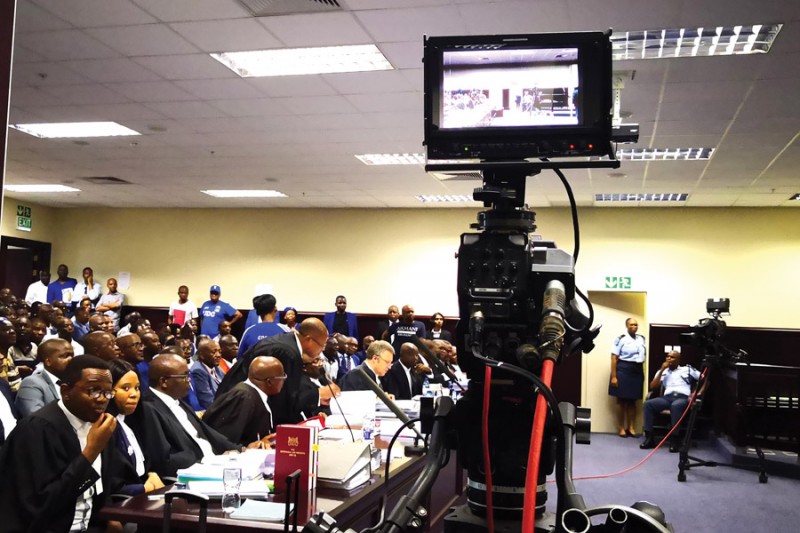Mmegi wins historical live streaming case
Staff Writer | Friday December 20, 2019 12:55


The decision comes after the publication made application to broadcast the legal arguments presented by the parties, oral evidence including the delivery of the rulings or judgements in the cases.
Mmegi through its Managing Editor, Titus Mbuya, who is DPC Managing Director, wanted its authorised representatives to be granted permission to install and set up such equipment as is necessary and that is unobtrusive and does not interfere with the proceedings, and with such technical specifications to obtain audio recording and/or transmission of the case.
“Sometime on or about the 23rd of October 2019, Botswana held its general elections which were contested by several political parties as well as independent candidates. Following the declaration of the results, some candidates of the UDC [Umbrella for Democratic Change] filed petitions challenging the results of the elections alleging some irregularities stated in the petitions already before court,” Mbuya said in his affidavit.
He also said it was apparent from the papers filed in the main application that the petitions raised weighty issues of great public interest such as the integrity of the elections that is being challenged, and there is a possibility of the outcomes of general elections in the constituencies that are being challenged being nullified. He reasoned that the possibility of a re-run existed in the challenged constituencies if the petitions are upheld by the Court.
“The petitions are evidently generally sui generis, since it will be the first time in the history of Botswana that there is challenge to 22 constituencies and six council wards.”
In the event the petitioners are successful, there is a possibility of a re-run, and if the petitioners win the re-runs, change of government is possible. “Therefore these petitions cannot be over-emphasised their importance to the public.”
He added: “It therefore goes without saying that the issues raised in this petitions are of significant public interest. It is highly probable that the court-room will be filled to capacity and this will not allow members of the public who may wish to follow proceedings, a chance to do so, due to inadequate space in the court-room”.
Over and above the issue of inadequate space in the court-room, members of the public from the challenged constituencies who do not reside in Gaborone nor its surrounding areas who are interested in following the proceedings but unable to attend court proceedings in person, would also be denied an opportunity to follow court proceedings on this matter.
“Court proceedings being public, broadcast of the proceedings through live streaming will only be an extension of the voice of the court, and applicant does not with respect, see any harm, in being granted permission to live broadcast the proceedings,” Mbuya submitted.
It is therefore in the public interest that the applicant be granted permission to cover the proceedings, more especially legal arguments presented by the parties to the main application, with a view to informing the general public on those proceedings.
The applicant also, through their digital platform have a right of freedom of expression, which justified the permission they sought seeks to broadcast the court proceedings. Freedom of expression which is constitutionally guaranteed, includes the freedom of the press.
“Such freedom of expression lies at the heart of a democracy, which this country prides itself with, hence the Constitution recognises that individuals in our society need to be able to hear, form and express opinions and views freely on a range of matters. The media therefore, as the applicant have a role to play in the protection and advancement of freedom of expression in our society, as every citizen or non-citizen has a right to receive information and ideas. The applicant and other media are therefore key agents in ensuring that the aspects of the right to communicate ideas and information to the general public are respected and enhanced.”
Mbuya asserted that broadcast of the proceedings will also enhance the principle of open justice. The broadcast of the proceedings will ensure public confidence in the workings of the judiciary. Allowing for a live broadcast of the proceedings, which are of great public importance will reduce summarised versions or accounts of journalists, which may be inaccurate, with the undesired result that the public’s understanding of the proceedings will be largely based on the understanding and view of the journalist covering the proceedings.
“It is therefore important that every interested member of the public, who have access to the internet, be given an opportunity to listen to the proceedings and follow them live, so that they may understand for themselves the arguments that are advanced to support the parties’ respective positions in this most important petitions.”
Mbuya explained that Mmegi newspaper reaches a very wide audience on Mmegi Facebook page both in Botswana and internationally. He averred that Mmegi Online is the applicant’s digital platform which has been in existence for almost 20 years now. It is visited by over one million viewers every month with over 500, 000 followers on Facebook.
Attorneys Onalethata Kambai and Joram Matomela represented Mmegi. The respondents did not oppose the application hence Justices Michael Leburu, Mercy Garekwe and Dr Godfrey Radijeng granted the order in favour of Mmegi.
The live broadcast was extended to other media outlets including Botswana Television which provided live feed to different media houses.
